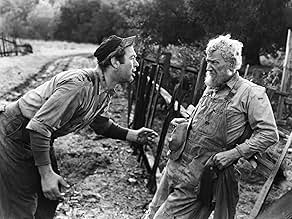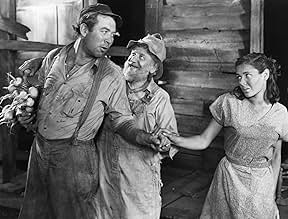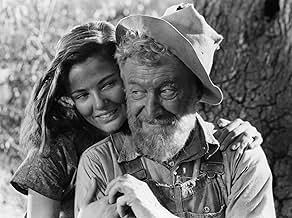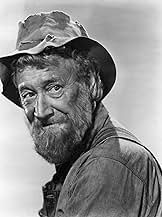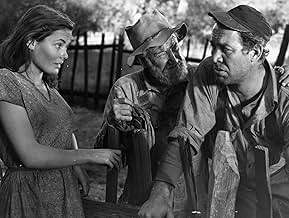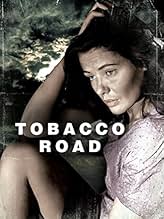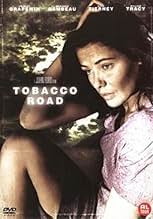NOTE IMDb
6,4/10
2,7 k
MA NOTE
La vie de famille dans une ferme en Géorgie rurale en 1941.La vie de famille dans une ferme en Géorgie rurale en 1941.La vie de famille dans une ferme en Géorgie rurale en 1941.
- Réalisation
- Scénario
- Casting principal
- Récompenses
- 2 victoires au total
Dorothy Adams
- Payne's Secretary
- (non crédité)
Avis à la une
Tobacco Road as was written by Erskine Caldwell and dramatized on Broadway for 8 years was brought to the screen by 20th Century Fox in a considerably altered state. It was thought of probably by Darryl Zanuck as a great property for John Ford seeing what he did with The Grapes Of Wrath.
The Grapes Of Wrath by John Steinbeck is a great piece of social commentary, an immortal work whether in print or on the big or small screen. Ford kept the spirit of Steinbeck's work completely intact and got a well deserved Best Director Oscar. In this one because Caldwell's Jeeters are not quite as noble as the Joads of The Grapes Of Wrath, they're not prototype rural proletarians. The changes took a lot of the drama and commentary and left the film not too far above the Weaver Family films and Ma and Pa Kettle.
Charley Grapewin and Bessie Patterson are Mr.&Mrs. Jeeter Lester and Jeeter is a guy determined to get by doing as little as possible. The whole family has his spirit. He's married most of his children off. One of the daughters in serious trouble of being an old maid at 23 and that was Gene Tierney if you can believe that. Her character in the book and play has a cleft palate and you can understand why she's not married off. Here she's just gorgeous Gene Tierney and a crucial element is missing.
There's another daughter Pearl whom we never see, but who's married to the loutish Ward Bond. She keeps running off and Bond just doesn't get it. Here he's just rustic lout, I suspect that the 13 year old Pearl figures she can do a whole lot better. That one I'm sure the Code was breathing hot and heavy over 20th Century Fox.
There's another physically deformed character and that's Marjorie Rambeau who has in the book a nose like a pig's snout. Grapewin palms off his 16 year old son as a new husband for Rambeau to get his hands on the insurance money her old husband left her. William Tracy as the kid who's no prize figures she's experienced and eager even if she's a psalm singer which she is.
The rough house comedy that typifies many a Ford film is funny, but hardly in the spirit of what Caldwell was writing. In the end I have to say that the film is not good John Ford, though he's done worse.
The Grapes Of Wrath by John Steinbeck is a great piece of social commentary, an immortal work whether in print or on the big or small screen. Ford kept the spirit of Steinbeck's work completely intact and got a well deserved Best Director Oscar. In this one because Caldwell's Jeeters are not quite as noble as the Joads of The Grapes Of Wrath, they're not prototype rural proletarians. The changes took a lot of the drama and commentary and left the film not too far above the Weaver Family films and Ma and Pa Kettle.
Charley Grapewin and Bessie Patterson are Mr.&Mrs. Jeeter Lester and Jeeter is a guy determined to get by doing as little as possible. The whole family has his spirit. He's married most of his children off. One of the daughters in serious trouble of being an old maid at 23 and that was Gene Tierney if you can believe that. Her character in the book and play has a cleft palate and you can understand why she's not married off. Here she's just gorgeous Gene Tierney and a crucial element is missing.
There's another daughter Pearl whom we never see, but who's married to the loutish Ward Bond. She keeps running off and Bond just doesn't get it. Here he's just rustic lout, I suspect that the 13 year old Pearl figures she can do a whole lot better. That one I'm sure the Code was breathing hot and heavy over 20th Century Fox.
There's another physically deformed character and that's Marjorie Rambeau who has in the book a nose like a pig's snout. Grapewin palms off his 16 year old son as a new husband for Rambeau to get his hands on the insurance money her old husband left her. William Tracy as the kid who's no prize figures she's experienced and eager even if she's a psalm singer which she is.
The rough house comedy that typifies many a Ford film is funny, but hardly in the spirit of what Caldwell was writing. In the end I have to say that the film is not good John Ford, though he's done worse.
The movie's essentially, a one-man showcase: Charlie Grapewin as the amiable n'er-do-well Jeeter Lester. He's a hoot and a half in his ragged overalls and bewhiskered face. Too bad the old coot just can't seem to get anything done, despite his uncomplaining, loyal wife (Patterson). Rarely did old Hollywood uglify settings as thoroughly as here. Lesters' shack looks like a wood pile, while others along the Road share that skid-row appearance. Trouble is that when you think about it, there's nothing funny about these miserable background conditions. Fortunately for the movie, Jeeter's comical antics distract from that troubling aspect. For example, I love the way the loose porch board keeps getting even with Jeeter's uncaring neglect in fixing it.
Yup, the Depression Era makes things especially tough for these Southern farmers, and the question the Lesters confront is whether they can get a loan before getting herded into the poor farm. Note too, how the sleek Captain Tim (Andrews) appears to represent a landlord class, while Jeeter is among his tenant farmers dependent on the upper class for support. At this point in the movie, however, all have fallen on hard times, though the Captain still looks spiffy and well-upholstered, unlike his tenants.
Nonetheless, the results are played for laughs, though I suspect many folks find the rural Southern caricatures more offensive than funny. For example, did they have to make young Dude Lester so dislikable-- that slug an angry Loy (Bond) puts on him was long overdue. Also, remind me not to loan my car to the Destruction Derby kid anytime, ever. Anyway, the movie is a sing-along for frog throats like me what with all those great old time gospel songs, even if choirmaster Sister Bessie (Rambeau) is caricatured. But please, get me a ticket to that old Road where I can maybe meet up with the luscious Ellie May (Tierney). I guess my biggest gripe is that Tierney doesn't get more screentime-- maybe all of it. On the other hand, I've definitely reached a new appreciation of the lowly turnip, of all things.
All in all, I suspect the TCF production does not wear well for many. Still and all, Grapewin delivers a rollicking performance, so give the 84-minutes a try if you haven't already.
Yup, the Depression Era makes things especially tough for these Southern farmers, and the question the Lesters confront is whether they can get a loan before getting herded into the poor farm. Note too, how the sleek Captain Tim (Andrews) appears to represent a landlord class, while Jeeter is among his tenant farmers dependent on the upper class for support. At this point in the movie, however, all have fallen on hard times, though the Captain still looks spiffy and well-upholstered, unlike his tenants.
Nonetheless, the results are played for laughs, though I suspect many folks find the rural Southern caricatures more offensive than funny. For example, did they have to make young Dude Lester so dislikable-- that slug an angry Loy (Bond) puts on him was long overdue. Also, remind me not to loan my car to the Destruction Derby kid anytime, ever. Anyway, the movie is a sing-along for frog throats like me what with all those great old time gospel songs, even if choirmaster Sister Bessie (Rambeau) is caricatured. But please, get me a ticket to that old Road where I can maybe meet up with the luscious Ellie May (Tierney). I guess my biggest gripe is that Tierney doesn't get more screentime-- maybe all of it. On the other hand, I've definitely reached a new appreciation of the lowly turnip, of all things.
All in all, I suspect the TCF production does not wear well for many. Still and all, Grapewin delivers a rollicking performance, so give the 84-minutes a try if you haven't already.
John Ford directed this adaptation of a hit play about a family of dirt poor toothless Southern farmers. Charley Grapewin is great and carries the film on his shoulders. Elizabeth Patterson gives an enjoyable (and sometimes sensitive) turn as his wife. William Tracy plays a savage character who grates on the nerves but he does a good job at it. Ward Bond is funny as a neighbor married to one of their daughters. He has the movie's most crowd-pleasing scene when he puts Tracy in his place. Dana Andrews and Gene Tierney have small roles. I think Tierney spoke less than twenty words the whole film.
Any comparison between this film and Ford's classic from the year before, Grapes of Wrath, is absurd. Beyond the very superficial similarities, they are nothing alike. This doesn't have the gravitas or artistry of that film. The closest it comes is the scene when Grapewin and Patterson talk about two of their children who left home and never returned. The rest is a grotesque comedy about people that are almost cartoon characters more than humans.
Obviously not for the easily offended among us. This film peddles in just about every Southern stereotype you can think of. Having grown up in the South with relatives not too far removed from the types of characters displayed in this, I'm not really bothered by it. Stereotypes generally have some basis in truth, no matter how much we don't want to admit it. Amusing at times, moving once or twice, but not the masterpiece it wants to be. See it for Grapewin's energetic performance if nothing else.
Any comparison between this film and Ford's classic from the year before, Grapes of Wrath, is absurd. Beyond the very superficial similarities, they are nothing alike. This doesn't have the gravitas or artistry of that film. The closest it comes is the scene when Grapewin and Patterson talk about two of their children who left home and never returned. The rest is a grotesque comedy about people that are almost cartoon characters more than humans.
Obviously not for the easily offended among us. This film peddles in just about every Southern stereotype you can think of. Having grown up in the South with relatives not too far removed from the types of characters displayed in this, I'm not really bothered by it. Stereotypes generally have some basis in truth, no matter how much we don't want to admit it. Amusing at times, moving once or twice, but not the masterpiece it wants to be. See it for Grapewin's energetic performance if nothing else.
Dirt poor, elderly Georgia farmer Jeeter Lester (Charley Grapewin) schemes to get some money so that he and his wife Ada (Elizabeth Patterson) can remain at their dilapidated frame house on Tobacco Road, in this Great Depression era story, part comedy, part drama.
As country hicks, most of the characters are rather too stereotyped to be realistic. The film's script is very talky, not surprising since the story originated as a stage play. The film's plot varies wildly from slapstick comedy to morose drama. And therein lies the main problem.
Rural poverty in the South during the 1930s was no laughing matter. It was an intensely painful and prolonged episode of human misery. I can understand how viewers in those days needed some comic relief, but not in a story about poverty. The hyper-antics of young Dude, the film's comic relief, are extremely annoying. Those scenes dilute the seriousness of the film's underlying theme. And the subplot wherein Dude and Sister Bessie go off together seems like plot filler.
Charley Grapewin gives a fine performance in the lead role. But Marjorie Rambeau as Sister Bessie, and William Tracy as Dude overact. Part of this overacting could have been the result of poor film direction.
The film's background music runs the gamut from frivolous and nondescript in the comedic scenes to old-time gospel songs like "Shall We Gather At The River" during more serious moments.
Given the era in which the film was made, "Tobacco Road" is okay, if you give it some slack. But the story would have been better without the slapstick comedy. In any event, it's a good movie to watch when you're depressed and think things can't get much worse.
As country hicks, most of the characters are rather too stereotyped to be realistic. The film's script is very talky, not surprising since the story originated as a stage play. The film's plot varies wildly from slapstick comedy to morose drama. And therein lies the main problem.
Rural poverty in the South during the 1930s was no laughing matter. It was an intensely painful and prolonged episode of human misery. I can understand how viewers in those days needed some comic relief, but not in a story about poverty. The hyper-antics of young Dude, the film's comic relief, are extremely annoying. Those scenes dilute the seriousness of the film's underlying theme. And the subplot wherein Dude and Sister Bessie go off together seems like plot filler.
Charley Grapewin gives a fine performance in the lead role. But Marjorie Rambeau as Sister Bessie, and William Tracy as Dude overact. Part of this overacting could have been the result of poor film direction.
The film's background music runs the gamut from frivolous and nondescript in the comedic scenes to old-time gospel songs like "Shall We Gather At The River" during more serious moments.
Given the era in which the film was made, "Tobacco Road" is okay, if you give it some slack. But the story would have been better without the slapstick comedy. In any event, it's a good movie to watch when you're depressed and think things can't get much worse.
Director John Ford was certainly an odd duck; the stories he was attracted to ran the gamut from "The Searchers" to "The Quiet Man" to this one, a head-scratcher of a tragicomedy based on Erskine Caldwell's book and Jack Kirkland's popular stage-adaptation. Eccentric Georgia farm family is threatened with poverty when the bank forecloses on their land, leading patriarch Jeeter to use his wiles in hopes of raising $100 for a year's worth of rent. Movie swings wildly from hick-slapstick to poignant drama; however, once you've had a chance to get attuned to Ford's rhythm, it's a pretty terrific ride. Charley Grapewin gives an Oscar-caliber performance (he wasn't even nominated!), and it's fun to see Gene Tierney and Dana Andrews looking very youthful three years before "Laura". Good show! *** from ****
Le saviez-vous
- AnecdotesWalter Brennan turned down the lead role because he disapproved of the character's laziness.
- GaffesWhen the new car is tipped over, after being driven on dirt roads and through mud, the underside is spotless.
- Crédits fousOpening and some of the closing credits are presented written in real sand.
- ConnexionsReferenced in Madame veut un bébé (1942)
- Bandes originalesDixie's Land
(uncredited)
Written by Daniel Decatur Emmett
[Variations often played as background music]
Meilleurs choix
Connectez-vous pour évaluer et suivre la liste de favoris afin de recevoir des recommandations personnalisées
- How long is Tobacco Road?Alimenté par Alexa
Détails
Box-office
- Montant brut mondial
- 534 $US
- Durée1 heure 24 minutes
- Couleur
- Rapport de forme
- 1.37 : 1
Contribuer à cette page
Suggérer une modification ou ajouter du contenu manquant

Lacune principale
By what name was La route au tabac (1941) officially released in India in English?
Répondre
